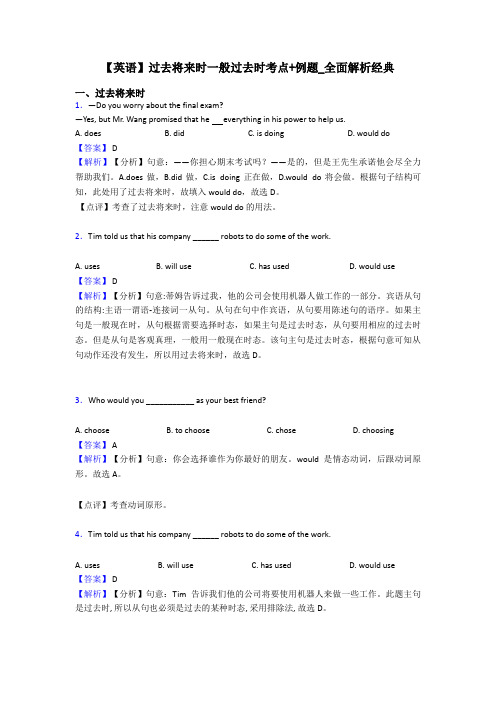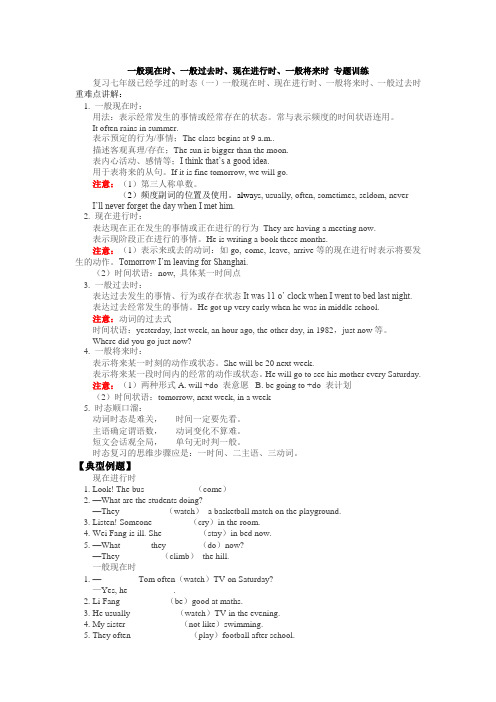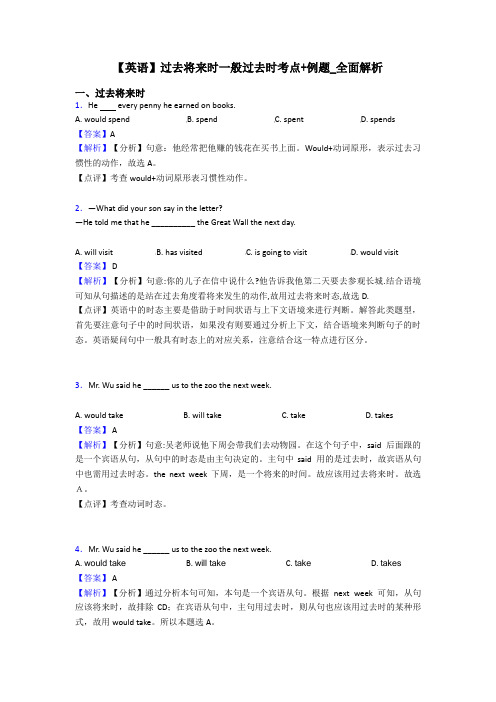一般将来时+一般过去时 讲解及练习题
最新过去将来时一般过去时知识点梳理及经典练习(超详细)

最新过去将来时一般过去时知识点梳理及经典练习(超详细)一、过去将来时1.She said that she ______to the Zoo the next Sunday.A. will goB. is goingC. would goD. has gone【答案】 C【解析】【分析】句意:她说她下周星期天去动物园。
A.一般将来时;B.一般将来时;C.过去将来时;D.现在完成时。
去动物园还没发生,用将来时,根据时间状语the next Sunday 可知,用过去将来时,would go,故选C。
【点评】考查动词的时态。
注意过去将来时的用法。
2.—What did your son say in the letter?—He told me that he __________ the Great Wall the next day.A. will visitB. has visitedC. is going to visitD. would visit【答案】 D【解析】【分析】句意:你的儿子在信中说什么?他告诉我他第二天要去参观长城.结合语境可知从句描述的是站在过去角度看将来发生的动作,故用过去将来时态,故选D.【点评】英语中的时态主要是借助于时间状语与上下文语境来进行判断。
解答此类题型,首先要注意句子中的时间状语,如果没有则要通过分析上下文,结合语境来判断句子的时态。
英语疑问句中一般具有时态上的对应关系,注意结合这一特点进行区分。
3.Mr. Wu said he ______ us to the zoo the next week.A. would takeB. will takeC. takeD. takes【答案】 A【解析】【分析】通过分析本句可知,本句是一个宾语从句。
根据next week可知,从句应该将来时,故排除CD;在宾语从句中,主句用过去时,则从句也应该用过去时的某种形式,故用would take。
【英语】过去将来时一般过去时考点+例题_全面解析经典

【英语】过去将来时一般过去时考点+例题_全面解析经典一、过去将来时1.—Do you worry about the final exam?—Yes, but Mr. Wang promised that he everything in his power to help us.A. doesB. didC. is doingD. would do【答案】 D【解析】【分析】句意:——你担心期末考试吗?——是的,但是王先生承诺他会尽全力帮助我们。
A.does做,B.did做,C.is doing正在做,D.would do将会做。
根据句子结构可知,此处用了过去将来时,故填入would do,故选D。
【点评】考查了过去将来时,注意would do的用法。
2.Tim told us that his company ______ robots to do some of the work.A. usesB. will useC. has usedD. would use【答案】 D【解析】【分析】句意:蒂姆告诉过我,他的公司会使用机器人做工作的一部分。
宾语从句的结构:主语一谓语-连接词一从句。
从句在句中作宾语,从句要用陈述句的语序。
如果主句是一般现在时,从句根据需要选择时态,如果主句是过去时态,从句要用相应的过去时态。
但是从句是客观真理,一般用一般现在时态。
该句主句是过去时态,根据句意可知从句动作还没有发生,所以用过去将来时,故选D。
3.Who would you ___________ as your best friend?A. chooseB. to chooseC. choseD. choosing【答案】 A【解析】【分析】句意:你会选择谁作为你最好的朋友。
would是情态动词,后跟动词原形。
故选A。
【点评】考查动词原形。
4.Tim told us that his company ______ robots to do some of the work.A. usesB. will useC. has usedD. would use【答案】 D【解析】【分析】句意:Tim 告诉我们他的公司将要使用机器人来做一些工作。
一般将来时、一般现在时、一般过去时、正在进行时练习题

一般现在时、一般过去时、现在进行时、一般将来时专题训练复习七年级已经学过的时态(一)一般现在时、现在进行时、一般将来时、一般过去时重难点讲解:1. 一般现在时:用法:表示经常发生的事情或经常存在的状态。
常与表示频度的时间状语连用。
It often rains in summer.表示预定的行为/事情;The class begins at 9 a.m..描述客观真理/存在;The sun is bigger than the moon.表内心活动、感情等;I think that’s a good idea.用于表将来的从句。
If it is fine tomorrow, we will go.注意:(1)第三人称单数。
(2)频度副词的位置及使用。
alwa ys, usually, often, sometimes, seldom, never I’ll never forget the day when I met him.2. 现在进行时:表达现在正在发生的事情或正在进行的行为They are having a meeting now.表示现阶段正在进行的事情。
He is writing a book these months.注意:(1)表示来或去的动词:如go, come, leave, arrive等的现在进行时表示将要发生的动作。
Tomorrow I’m leaving for Shanghai.(2)时间状语:now, 具体某一时间点3. 一般过去时:表达过去发生的事情、行为或存在状态It was 11 o’ clock when I went to bed last night.表达过去经常发生的事情。
He got up very early when he was in middle school.注意:动词的过去式时间状语:yesterday, last week, an hour ago, the other day, in 1982,just now等。
语法专练初中英语一般将来时讲解与练习(含答案)50题

初中英语:一般将来时专项练习题1.The 24th Winter Olympics in China in 2022.A.hold B.will hold C.are held D.will be held 【答案】D【解析】【详解】句意:第24届冬奥会将于2022年在中国举行。
考查被动语态。
in 2022是将来的时间,用于一般将来时,需借助will构成,可排除AC 选项。
主语The 24 Winter Olympics是动词held的受动者,需用被动语态,可排除B项。
根据句意结构,可知选D。
2.He has ordered a watch on line for his father and it _______ to him before Father’s Day.A.send B.will be sent C.was sent D.sent【答案】B【解析】【详解】试题分析:句意:他在网上为父亲订了一块表。
将在父亲节前寄给他。
It指代的是“表”,作主语,与谓语动词send是逻辑上的动宾关系,it是其承受者,用被动语态;从时态上看,表将在父亲节前寄给他,用一般将来时态,故选B。
考点:考查动词时态及语态辨析。
3.The School Art Festival_____ next month. You'd better prepare a talent show.A.holds B.is held C.will hold D.will be held 【答案】D【解析】【详解】句意:学校艺术节在下个月举办,你最好准备一个才艺展示。
考查一般将来时的被动语态。
holds一般现在时;is held一般现在时的被动语态;will hold一般将来时;will be held一般将来时的被动语态。
根据句中的时间状语“next month”可知,本句时态为一般将来时,再根据句意可知,主语“The School Art Festival”和谓语hold为逻辑上的动宾关系,应用被动语态。
六年级上一般现在时、现在进行时、一般将来时、一般过去时讲解及专项练习

六年级上一般现在时、现在进行时、一般将来时、专项练习Class:_________ Name:_________ No:_________小学英语3种时态复习一、用动词的正确形式填空1. I ________________ (do) my homework every evening.2. We _________________ (fly) kites in the park next Sundays.3. Tom ___________(play) the piano every Saturday. Now he________ (play).4. She _______(like) swimming. She ___________ (swim) this weekend.5. Usually my mother _______ (wash) the dishes after lunch. But my grandma____________ (wash) now.6. Look at the man! He ___________ (read) a magazine.7. Look! The plane ______________ (fly) over the building.8. Listen! My aunt ____________ (sing) in the room.She is a singer. She _____ (like) singing. She _______(have) a music show. She is excited.9. Tom and Mike always ______ (swim) in the river. They _____ (swim) in the swimming pool this Sunday. Look! They ______ (swim).10. What ______ you usually ______ (do) in the evening?I _______ (play) computer games.11. What _______ you _______ (do) now?I _______ (make) a paper plane.12. What _______ he _______ (do) now?He ______ (dance).13. ______ your mother ______ (read) newspaper in the morning?Yes, She ________ .16. _______ you _______ (like) fishing?No, I ______ . I like ______ (swim),but my brother ______ (like).17. How ______ your father _______ (go) to work every day?He ______ (go) by bike. But it’s cold today. He ______ (take) the No.21 bus, 18. _______ the monkey _______ (like) climbing trees? Yes, it _______ .19. What _______ your father ______ (do) after lunch? He _______ (read) acomic book.20. ________ you ______ (collect) stamps? Yes. I _______ .________ your brother ______ (collect), too? No, he ________ .二、选择题1. _____ he _____ to the park at 6:30 in the morning? No,he _____ .A. Does; goes; doesB. Does; go; doesn’tC. Does; go; does2. Tim always _____ a picture at home. He _____ a car now.A. draws; is drawingB. draw; drawC. draws; draw3. She usually _____ her friends. They often _____ tea.A. see; drinkB. sees; drinksC. sees; drink4. He usually _____ the dishes at night, but tonight he _____ clothes.A. wash; washB. washes; is going to washC. is washing; washes5. Mr. Green usually _____ his newspaper in the evening, but he and his wife _____ television this evening.A. reads; watchesB. reads; are going to watchC. reads; watch6.Where are the man and the woman? They _____ near the tree.A. sitB. sitsC. are sitting7. _____ your father _____ diving? No, he _____ .He ______ writing stories.A.Does; like; doesn’t; likesB.Does; likes; doesn’t; likeC.Do; like; don’t; likes8. Mr. Green often _____ his newspapers at night. But he _____ an interestingbook tonight.A. reads; readsB. reads; readC. reads; is going to read9. The old man _____ playing sports in the park. He _____ morning exercisenow.A. likes; is doingB. likes; doesC. like; doing10. Where ______ the boy _____ ? He _____ across the river now.A. does; swim; swimsB. is; swimming; is swimmingC. is, swim, is swimming11. _____ you _____ to music now? Yes, we _____ .A. Do; listen; doB. Did; listen; didC. Are; listening; are12. Look! Two cats ______ across the wall.A. runB. runsC. are running13. She _____ tea, but he _____ .A. likes; doesn’t B; like; don’t C. like; doesn’t一般过去时一般过去时的构成:一般过去时是用动词的过去式来表示。
【英语】 过去将来时一般过去时易错点汇总及练习测试题(1)

【英语】过去将来时一般过去时易错点汇总及练习测试题(1)一、过去将来时1.Mr. Wang said he ______ us ______ for another two weeks.A. will allow; to workB. will allow; workC. would allow; to workD. has allowed; work 【答案】 C【解析】【分析】句意:王先生说他将允许我们再工作两周。
根据句子结构可知,这是含有宾语从句的主从复合句,主句的谓语动词是said,是过去时,故从句也要用过去的某种时态;从句的时间状语是for another two weeks,又两周,所以从句是将来时,故用过去将来时,所以第一个空填would allow;另外第二个空allow sb. to do sth.允许某人做某事,固定短语,故选C。
【点评】此题考查宾语从句和固定短语。
注意从句的时态和allow sb. to do sth.固定短语。
2.—What did your son say in the letter?—He told me that he __________ the Great Wall the next day.A. will visitB. has visitedC. is going to visitD. would visit【答案】 D【解析】【分析】句意:你的儿子在信中说什么?他告诉我他第二天要去参观长城.结合语境可知从句描述的是站在过去角度看将来发生的动作,故用过去将来时态,故选D.【点评】英语中的时态主要是借助于时间状语与上下文语境来进行判断。
解答此类题型,首先要注意句子中的时间状语,如果没有则要通过分析上下文,结合语境来判断句子的时态。
英语疑问句中一般具有时态上的对应关系,注意结合这一特点进行区分。
3.I didn't know when he _____ back. He said he would call me when he _____ home.A. would come, gotB. came, gotC. will come, getsD. came, would get【答案】 B【解析】【分析】句意为:我不知道他什么时候回来。
【英语】过去将来时一般过去时考点+例题_全面解析

【英语】过去将来时一般过去时考点+例题_全面解析一、过去将来时1.He every penny he earned on books.A. would spendB. spendC. spentD. spends【答案】A【解析】【分析】句意:他经常把他赚的钱花在买书上面。
Would+动词原形,表示过去习惯性的动作,故选A。
【点评】考查would+动词原形表习惯性动作。
2.—What did your son say in the letter?—He told me that he __________ the Great Wall the next day.A. will visitB. has visitedC. is going to visitD. would visit【答案】 D【解析】【分析】句意:你的儿子在信中说什么?他告诉我他第二天要去参观长城.结合语境可知从句描述的是站在过去角度看将来发生的动作,故用过去将来时态,故选D.【点评】英语中的时态主要是借助于时间状语与上下文语境来进行判断。
解答此类题型,首先要注意句子中的时间状语,如果没有则要通过分析上下文,结合语境来判断句子的时态。
英语疑问句中一般具有时态上的对应关系,注意结合这一特点进行区分。
3.Mr. Wu said he ______ us to the zoo the next week.A. would takeB. will takeC. takeD. takes【答案】 A【解析】【分析】句意:吴老师说他下周会带我们去动物园。
在这个句子中,said 后面跟的是一个宾语从句,从句中的时态是由主句决定的。
主句中said 用的是过去时,故宾语从句中也需用过去时态。
the next week 下周,是一个将来的时间。
故应该用过去将来时。
故选A。
【点评】考查动词时态。
4.Mr. Wu said he ______ us to the zoo the next week.A. would takeB. will takeC. takeD. takes【答案】 A【解析】【分析】通过分析本句可知,本句是一个宾语从句。
一般将来和过去将来时练习

一般将来时专项练习:一、单选1 _____you ____a doctor when you grow upA Will; going to beB Are; going to beC Are; /D Will; be2 I don’t know if his uncle _____. I think he _____ if it doesn’t rain.A will come; comesB will come; will comeC comes; comesD comes; will come3 He will be back _____a few minutes. A with B for C on D in4 What time _____we meet at the gate tomorrow A will B shall C do D are5 He will have a holiday as soon as he _____the work next week.A finishesB doesn’t finishC will finishD won’t finish6 There _____some showers this afternoon.A will be B will have C is going to be D are going to have7 It ____my brother’s birthday tomorrow. She _____a party.A is going to be; will haveB will be; is havingC will be; is going to haveD will have; is going to be8 Li Ming is 10 years old now, next year he _____11. A is B is going to be C will be D will to be二、填空1 -“I need some paper.”- “I ____(bring)some for you.”2____(be)you free tomorrow3 They _________(not leave) until you come back.4 _____we_____(go) to the party together this afternoon5 They want to know when the meeting _____start.6 I _____(go) with you if I have time.7 Hurry up! Or we ______(be) late.8What ____you _______(do) tomorrow afternoon9 Jenny ____ _____ (do) an experiment the day after tomorrow.10 If she isn’t free tomorrow, she _______(not take) part in the pa rty.做题时常见错误如下:一、易忽视动词用原形形式例:1 He will is (be) at school next Monday.2 He is going to does (do) his homework after school.答案:1 be 2 do解析:第一题有的同学一看he做主语就用了is,忽视了will后应加动词原形。
- 1、下载文档前请自行甄别文档内容的完整性,平台不提供额外的编辑、内容补充、找答案等附加服务。
- 2、"仅部分预览"的文档,不可在线预览部分如存在完整性等问题,可反馈申请退款(可完整预览的文档不适用该条件!)。
- 3、如文档侵犯您的权益,请联系客服反馈,我们会尽快为您处理(人工客服工作时间:9:00-18:30)。
时态练习
1.一般将来时:
一般将来时表示的是将要发生的或者计划着要做的事情。
n ext….days later, tomorrow, the day after tomorrow 等表示将来时间的词或词组是一般将来时的重要标志。
另外还可以通过上下文的语境来判断。
如:The winter holiday is coming soon.
I am going to Harbin to watch snow .
具体有两种形式表示:
1.主语+be going to +动词原形
2.主语+will/shall +动词原形
两种形式的区别在于:
“be going to+动词原形”强调“打算,计划要做的事情。
“will/shall+动词原形”没有强调这种计划性,只是客观说明某事将要发生。
3.具体的句型如下:
肯定句:主语+be going to +动词原形
主语+will/shall+动词原形
否定句:主语+be not going to +动词原形
主语+will/shall not+动词原形will not=won’t
一般疑问句:Be+主语+going to+动词原形?
Will/Shall+主语+动词原形?
特殊疑问句:特殊疑问词+be+主语+going to +动词原形?
特殊疑问词+will/shall+主语+动词原形?
选择题:
1.We are going to _______on the moon in 20 years’ time.
A. walks
B. walking
C. walk
2.I am going to______ a teacher 10 years latter.
A. are
B. is
C. be
3.It will_______ very cold tomorrow.
A. be
B. is
C. going to be
4.Chen Jie will ________China some days.
A. leave
B. going to leave
C. leaves
5._________you coming to class next Sunday?
A. Will
B. Are
C. Shall
6.Mike often_______ exercise on Thursday afternoon.
A. takes
B. is taking
C. is going to take
7.Is he going to the shop to buy a magazines? Yes, he_____.
A. be
B. is
C. shall
8.Will you be a teacher? No, I_____.
A. am not
B. won’t
C. will
9.Are you coming this afternoon? No, I_______.
A. aren’t
B. won’t
C. will
10.___________be snowy 2days later?
A. I’ll
B. It’ll
C. We’ll
一般过去去时:
一般过去去时表示的是在过去的某一时间里发生的事情,句子中的
动词用过去式表示。
通常能在句子中找到表示过去时间的词或词组
如:yesterday, last night, 3 days ago, before等
具体句型如下:
肯定句:主语+动词过去式
否定句:主语+didn’t+动词原形
主语+wasn’t/weren’t+名词/形容词
一般疑问句:Did +主语+动词原形?
Was/Were +主语+名词/形容词?
特殊疑问句:特殊疑问词+主语+动词原形?
特殊疑问词+Was/Were+主语+名词/形容词
动词过去式的变化规律:
不规则变化(常见):
is/am—— have—— do—— read——
go—— drive make sing
leave catch fall grow take
bring put hit swim wake
are get say see feel sit write come drink buy fly know think can run tell wear think
选择题:
1.I went to Xinjiang last month. It____ not fun
A.is
B.was
C.were
2.Did you _____ in the party last night?
A.sing
B.sings
C.singing
3.Ben _____a lot of cold water yesterday.
A.drinks B.drinked C.drank
4.Xiaoling_____many pictures when she went out.
A.takes
B.took
C.taked
5.Yesterday was my birthday.My dad_____a present for me.
A.bought
B.buys
C.buyed
st week,we _______different animals in the zoo.
A.see
B.seeing
C.saw
7.Can you row a boat? Yes,I___ a boat with Tom yesterday.
A.row
B.rowing
C.rowed
8.The train ____at about 10:00 last night.
A. leaves
B. leaving
C. left
9.Jenny ____me not to come near the snake last night.
A.tell
B.telled
C.told
10.she _______me to play football.
A.teach
B.taught
C.teaches。
